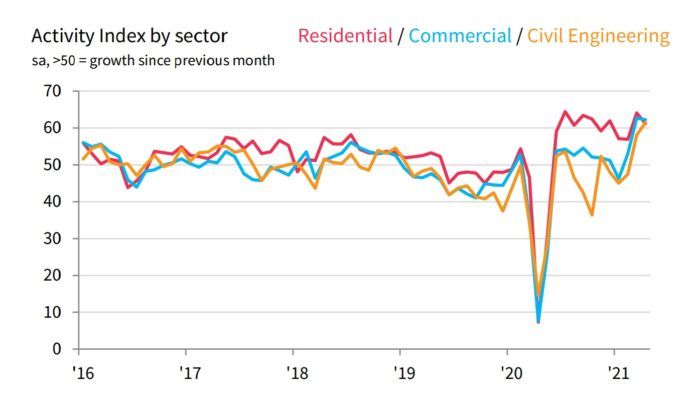UK construction companies signalled a strong increase in output volumes during April, with continued recoveries seen in civil engineering activity, commercial work and house building, with workloads being boosted by the fastest rise in overall new orders since September 2014.
However, demand and supply imbalances meant that the rate of input cost inflation picked up for the seventh month in a row to its highest since the survey began in April 1997.
The headline IHS Markit/CIPS UK Construction PMI Total Activity Index posted 61.6 in April, down only fractionally from March’s six-and-a-half year peak of 61.7. Any figure above 50.0 indicates an overall expansion of construction output. The index has posted in growth territory in 10 of the past 11 months, with January 2021 the exception.
Commercial work (index at 62.2) was the best-performing broad category of construction output in April, although the rate of expansion eased slightly since March. Survey respondents widely commented on a boost to client demand from rising business confidence and the reopening of the UK economy.
Civil engineering (index at 61.5) bucked the softer overall growth trend in April and signalled its fastest speed of recovery since September 2014. Construction companies often cited increased levels of work on major infrastructure programmes, including contract awards from HS2 and Highways England.
Meanwhile, house building (index at 61.2) continued to rise at a strong pace in April, but the rate of growth eased from March’s recent peak (64.0). There were widespread reports of robust demand for residential building projects and new housing developments.
Total new work increased for the 11th consecutive month in April. Moreover, the latest improvement in order books was the strongest for just over six-and-a-half years. This contributed to the steepest rate of job creation across the construction sector since December 2015.
Mirroring the trend for new business, input buying expanded at the fastest pace since September 2014. A rapid rise in demand for construction products and materials continued to stretch supply chains in April. The latest lengthening of suppliers’ delivery times was the third greatest since the survey began in 1997, exceeded only by those seen during the lockdown in April and May last year. Construction firms mostly cited demand and supply imbalances, but some suggested that Brexit issues had caused delays with inputs arriving from the EU.
Higher prices paid for a wide range of construction items contributed to the fastest overall rate of cost inflation since the survey began in April 1997 (index at 84.6, up from 77.8 in March). Steel, timber and transportation were among the most commonly reported items up in price.
Looking ahead, construction companies remained highly upbeat about their growth prospects in April. More than half of the survey panel (57%) expect a rise in business activity during the next 12 months, while only 7% forecast a decline.
Thoughts from the Federation of Master Builders…
Commenting on the data, Brian Berry, chief executive of the Federation of Master Builders, said: “It is very positive news that construction remains resilient after the pandemic, but concerns in the PMI data about record high material prices reflect the very real worries of our members.
“With residential construction activity lagging behind other sectors, I urge the government to use the re-set moment of the Queen’s Speech to lay out a programme that backs Britain’s builders, with a renewed focus on enabling construction SMEs, who make up 99% of the construction industry, to thrive in what is an increasingly costly market.”
Brian continued: “The government needs to set out a clear plan about how to make our existing homes greener and more energy efficient to achieve net zero by 2050. Such a plan would be a boost to local trades, who are best placed to retrofit our homes. To make a success of this ‘green revolution’, serious consideration needs to be given to how we solve the industry’s skills shortage and ensure that construction is seen as an attractive and fulfilling career for both school leavers and those looking to re-skill. As SMEs train 71% of construction apprentices, they must be at the heart of these conversations.”




